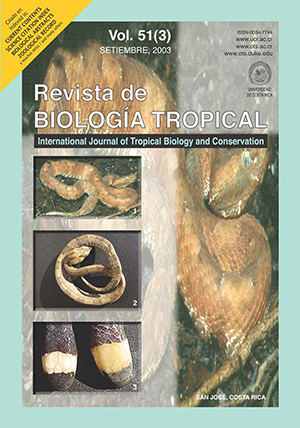Resumen
Para comparar diferentes niveles y calidades de lecitina se hizo un bioensayo nutricional con dietas isoenergéticas; para medir el crecimiento, la tasa de conversión alimenticia y sobrevivencia de juveniles de P. vannamei (290 mg ± 0.02). Las lecitinas experimentales fueron de calamar, lecitina liquida de soya (7%), lecitina desaceitada de soya (3.48%) en combinación con aceite de pescado o lípidos neutros de calamar, en una formula parcialmente desaceitada. Las cinco dietas fueron administradas ad libitum con cuatro replicas (estanques) de 15 camarones cada uno (5 x 4 x 15), durante 28 días. La mayor ganancia en peso fue (191%) y FCR (1.69±0.041) fueron obtenidos con la dieta que contenía 7% de lecitina cruda de soya como única fuente de lípidos, seguida por la dieta que contenía 3.94% de lecitina desaceitada y 2.24% de aceite Menhaiden (172% y 2.03±0.054 respectivamente). Como se esperaba los resultados menos propicios fueron con la dieta que no contenía lecitina (121% y 2.42±0.129). La lecitina cruda de soya, cubrió los requerimientos de fosfolípidos y de lípidos neutrales, tanto como la dieta con lecitina desaceitada de soya con aceite de pescado o aceite de calamar##plugins.facebook.comentarios##

Esta obra está bajo una licencia internacional Creative Commons Atribución 4.0.
Derechos de autor 2003 Revista de Biología Tropical
Descargas
Los datos de descargas todavía no están disponibles.


